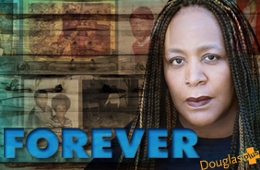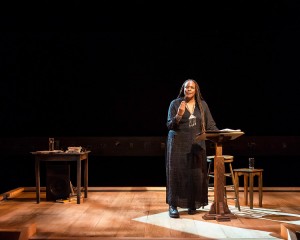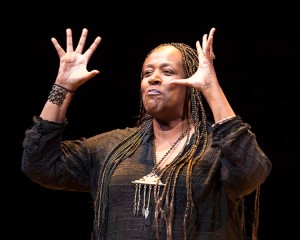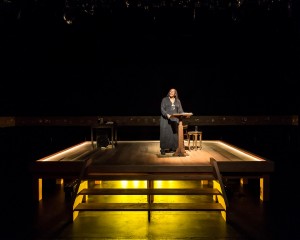ORLANDERSMITH CAN SEE FOREVER
There is a timeless quality to stories about families, particularly families riddled with alcoholism, drug addiction, bitterness, hatred, sadness, and lost dreams. Whether in the canon of literature (O’Neill anyone?) or through personal experience held close to a shamed soul, these tales have a “forever” quality.
Which brings us to Forever, Dael Orlandersmith’s world premiere one-woman show at the Kirk Douglas Theatre in Culver City. It’s not really until the last line of her riveting 90-minute monologue that we understand why she chose that title, but by then it makes sense. Our families – real or imagined, nightmarish or idealized – live in us forever.
Forever is staged very simply on a raised wooden platform with a podium to one side and a table on the other that holds an old-fashioned record player, a candle, and a few other objects. As designed by Takeshi Kata, the set also includes a three-sided, lit back wall displaying photos of Orlandersmith’s family members.
Orlandersmith, a tall woman with long braids, wears a long, loose-fitting black dress and black boots. She doesn’t move much on stage, rarely punctuates her performance with other characters’ voices, and often glances at the script she keeps on the podium. It’s old-fashioned storytelling, the campfire kind, enhanced by focused but subtle lighting by Mary Louise Geiger.
And it’s powerful, poetic storytelling, the kind that creeps up on you slowly and stays with you.
It all starts innocently enough. Orlandersmith is in Paris, at the famed Pere Lachaise Cemetery, where so much incredible talent is buried – among others, there is Edith Piaf, Oscar Wilde, Chopin, Collette, Richard Wright, and Jim Morrison.
“There is movement in this silence,” Orlandersmith says. “All these people have given birth to ourselves.”
She is referring, of course, to her artistic and literary ancestors, the ones who moved her, inspired her. She is thrilled to be with them. But they’re not blood.
Blood is her mother, the main subject of Forever. “My mother, vermin-stained with home booze and cigarettes.” A mother, Beulah Camalora Smith, who beats her daughter frequently and then demands that the girl lie next to her in a tearful, regretful sleep, “playing mother, lover, daughter.” A mother who lashes out at her: “Don’t forget that you will always be nothing.” A mother who cuts deeply: “You’re fat, you’re hateful, you’re disgusting.”
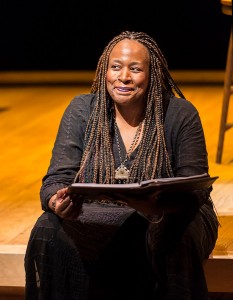 And yet, a mother who had “some moments of softness.” A mother who dreams of going to Paris, recites poetry (“I see a hint of girl”) and cultivates in her daughter a love for the arts. A mother who danced professionally but ended up a bitter, single woman raising her daughter in Harlem.
And yet, a mother who had “some moments of softness.” A mother who dreams of going to Paris, recites poetry (“I see a hint of girl”) and cultivates in her daughter a love for the arts. A mother who danced professionally but ended up a bitter, single woman raising her daughter in Harlem.
To escape this mother, Orlandersmith creates other families or seeks solace in writers and musicians. She is a black Harlem girl with albums by The Doors and other white male recording artists. She relates to the tortured Tyrone family in Long Day’s Journey Into Night. She dreams of marrying Irish-American New York cop Terrence O’Malley, who shows her kindness when she most needs it, and living happily in Ireland with him. She wants to make the “rock ’˜n roll outside kids” she hangs out with on the streets of Greenwich Village her family.
As she grows, she rebels. She calls her mother “filth.” She graduates from high school at 16, determined to leave but somehow unable to do so.
It is only at Beulah’s death that she finds some peace in their relationship. Without sentimentality, she sees something of “the South Carolina girl who dreamed of more” and the woman with “poetry dangled on your lips.”
As directed by Neel Keller, Orlandersmith’s performance is unfussy. Her words speak for themselves. The words are potent, the sentences often lyrical.
Although it is lamentable that the Kirk Douglas is staging a lopsided number of one-person shows for what one suspects are financial reasons, Forever demonstrates the power of solo pieces when done well.
photos by Craig Schwartz
Forever
Center Theatre Group
Kirk Douglas Theatre
9820 Washington Blvd. in Culver City
scheduled to end on October 26, 2014
for tickets, call (213) 628-2772 or visit www.CenterTheatreGroup.org
